Politics
/ArcaMax

House approves ban on transgender students in girls' sports
WASHINGTON — The U.S. House has passed a bill that would prohibit federal funding from flowing to schools unless they ban transgender athletes from women’s and girls’ sports.
Two Democrats, Texas Reps. Henry Cuellar and Vicente Gonzalez, voted with Republicans in favor of the legislation.
“As a grandfather to six wonderful, capable ...Read more

California needs federal help after Los Angeles fires. Why is Congress so slow to act?
WASHINGTON — Just before Christmas, Congress approved billions of dollars in relief funds to help victims of devastating wildfires in Maui and Hurricanes Helene and Milton in the Southeast.
Congress was acting a year and a half after the Hawaii disaster, and two months after Western North Carolina and other areas were devastated.
Now ...Read more

Republican Nancy Mace challenges Democrat Jasmine Crockett to a fight on House floor
A heated meeting of the House Oversight Committee erupted into chaos on Tuesday when South Carolina Republican Nancy Mace challenged Texas Democrat Jasmine Crockett to a fight on the House floor.
Rep. Mace took offense to Crockett calling her “child” while criticizing her anti-trans messaging.
“Somebody’s campaign coffers really are ...Read more
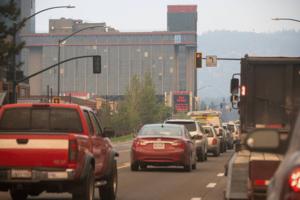
Nevada Sen. Cortez Masto reintroduces legislation to prevent wildfires
U.S. Sen. Catherine Cortez Masto reintroduced legislation aiming to combat and prevent wildfires Tuesday as a series of catastrophic wildfires continued to burn in Southern California.
The Western Wildfire Support Act — introduced alongside Republican Montana Sen. Tim Sheehy — would authorize funding for firefighting equipment, creating new...Read more
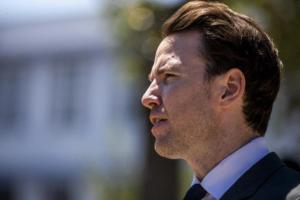
California Coastal Commission faces more fallout from SpaceX decision, this time from Congress
U.S. Rep. Kevin Kiley, R-Calif., on Tuesday announced his intention to file a bill that would strip the California Coastal Commission of its authority to review certain activities relating to national security, critical infrastructure or with a high economic impact.
This comes months after the commission voted to bar SpaceX — the private ...Read more
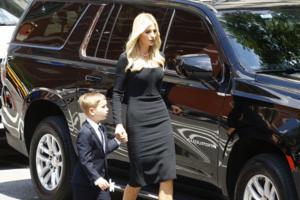
Ivanka Trump reveals why she won't return to the White House
As her father prepares to take up the presidency for a second time next week, Ivanka Trump revealed that she “hates politics” and has no intention of returning to work at the White House.
The 43-year-old former presidential adviser shared the multiple reasons she decided to sit this term out while appearing on Tuesday’s episode of the “...Read more
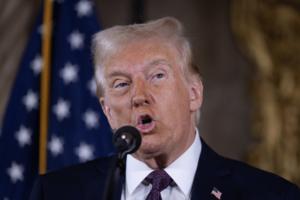
Parole program for Cubans, Haitians, Nicaraguans, Venezuelans continues. Trump wants it gone
The Department of Homeland Security says it is continuing to accept requests for asylum-seekers arriving at the U.S.-Mexico border, and is authorizing travel for certain nationals of Cuba, Haiti, Nicaragua and Venezuela seeking to lawfully enter the United States through a humanitarian parole program beyond Jan. 20, when President-elect Donald ...Read more

Here's what happens with TikTok if Supreme Court upholds ban
TikTok remains on schedule to be banned in the U.S. beginning Sunday, one day before President-elect Donald Trump takes office.
In high-pressure hearings last Friday, the Supreme Court appeared likely to rule in favor of the ban.
But even if the ban does go into effect, TikTok will not disappear from users’ phones. In fact, it will remain ...Read more
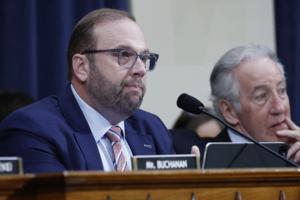
Trump tax cuts: What's at stake as House GOP, Dems debate extending signature plan
There’s less than a week before President-elect Donald Trump begins his second term, and congressional Republicans are already working to preserve one of his signature policies.
The House Ways and Means Committee on Tuesday held a hearing on the future of Trump’s 2017 tax overhaul, as witnesses described what the cuts mean for American ...Read more

What will happen to Donald Trump's New Jersey liquor licenses after his punishment-free sentencing in hush money case?
The New Jersey Office of the Attorney General’s Division of Alcoholic Beverage Control is determining whether President-elect Donald Trump is qualified to hold an interest in the liquor licenses at his New Jersey golf courses after he received a zero-punishment sentencing in his New York hush-money trial last Friday.
Since Trump’s felony ...Read more
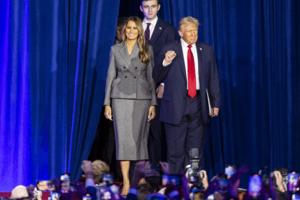
Melania Trump breaks her silence about where she will spend her time after Jan. 20
This isn’t Melania Trump’s first rodeo.
The soon-to-be first lady (for the second time) sat down with "Fox & Friends" on Monday to reveal the game plan after husband Donald Trump takes office.
Apparently, she won’t be a full-time Washington, D.C., resident, preferring to split her time among three cities on an as-needed basis.
So expect...Read more
Trump backs DeSantis' call for state lawmakers to act this month on immigration
TALLAHASSEE, Fla. — President-elect Donald Trump is backing Florida Gov. Ron DeSantis’ decision to call state lawmakers back to Tallahassee later this month for a special session to ensure state and local law enforcement officials are helping enforce Trump’s immigration agenda.
“Thank you Ron, hopefully other Governors will follow!” ...Read more
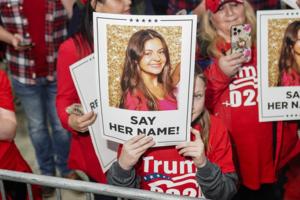
The Senate is considering the Laken Riley Act. Here's what it would do
WASHINGTON — The Senate could vote Tuesday on the Laken Riley Act, a Republican-led bill that mandates federal detention for immigrants who are charged with minor crimes and grants broad enforcement powers to states.
It passed the House earlier this month as the first bill taken up by the new, Republican-controlled Congress and moved forward ...Read more

Michelle Obama will not attend Trump inauguration
Michelle Obama’s office released a statement Tuesday, saying that the former first lady will not accompany her husband to Donald Trump’s inauguration next Monday. It will be the second time in two weeks that she has missed a gathering of U.S. leaders and their spouses, after she also didn’t attend the Jan. 9 funeral of former President ...Read more

How the CIA director helps the US navigate a world of spies, threats and geopolitical turbulence
Today, the United States is navigating an increasingly unsettled world. The positions advising the president on national security are as important as ever. One such position, the director of the Central Intelligence Agency, is key to providing the president and Cabinet with timely intelligence and analysis.
So, what is the job of ...Read more

Biden opens federal land for AI development
WASHINGTON — President Joe Biden on Tuesday signed an executive order that opens federal land for private development of infrastructure and the energy supply needed to create advanced artificial intelligence models in the United States.
The order, which mentions “clean power” a dozen times, dovetails with other Biden administration ...Read more
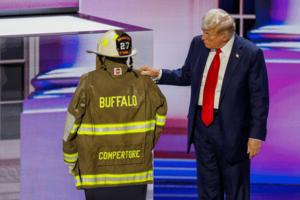
Butler first responders and an award-winning horse named Trump will represent Pennsylvania in Trump's inaugural parade
PHILADELPHIA — When President-elect Donald Trump ends his inaugural address next week, a group of police and EMTs who responded to the assassination attempt on his life in Butler will lead a parade down Pennsylvania Avenue.
The July assassination attempt at the Butler Farm Show Grounds — just days before the Republican National Convention �...Read more
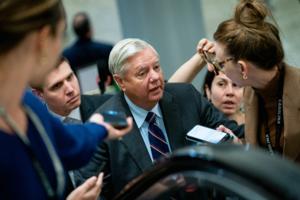
Senate guidance on budget bills would put House at disadvantage
WASHINGTON — Senate GOP leaders’ push to split up President-elect Donald Trump’s fiscal priorities into two filibuster-proof budget packages has a bigger tactical disadvantage for House Republicans than commonly understood: They’d likely have to vote on two budget resolutions, never an easy task even with bigger majorities.
A budget ...Read more
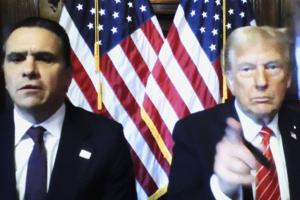
Editorial: Playing politics with Justice: Trump DOJ broke the rules on leaks about COVID nursing homes probes
Donald Trump has endlessly complained about the Department of Justice abusing its wide-reaching powers to make improper political attacks on him. But it was the DOJ under Trump himself that did exactly that to the Democratic governors of New York and New Jersey in late October 2020, violating department policy. So says the DOJ’s own ...Read more
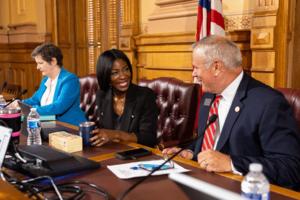
Georgia Election Board's private Gmail questioned in transparency lawsuit
ATLANTA — Two Republican State Election Board members who use private Gmail accounts for official business have refused to allow searches of their emails, leading to an accusation that they’re violating government transparency laws.
A lawsuit by the watchdog group American Oversight alleges the State Election Board has “systematically ...Read more
Popular Stories
- 4 reasons why the US might want to buy Greenland – if it were for sale, which it isn’t
- Trump wants to rekindle his Kim Jong Un bromance, but North Korea has other suitors now
- Georgia Senate revives panel investigating Fulton DA Fani Willis
- Trump's immigration plans could imperil long-term care workforce
- A brief history of presidential inaugural speeches, from George Washington to today


























































